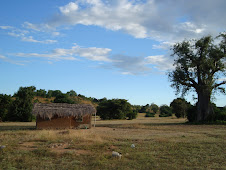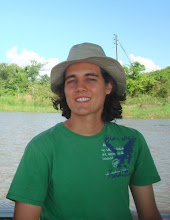
I work as a volunteer with the partnership project at a book shop for DAPP (Development Aid from People to People). DAPP has been working with social projects since 1995 and today there are 5 different projects in Malawi: Teacher Training College, Vocational School, Farmers Club, Total Control of the Epidemic and DAPP Second Hand. I'm in DAPP Second Hand Project that is a partnership project to raise money for all the other projects in Malawi. DAPP Second Hand Project has two ways to raise fund. One is the Book Shop that I work and the other way to raise fund is the Clothes and Shoes Shops. The Book Shop sells second hand books from UK and USA that are collected from containers located in some cities in these countries. The books came to Africa by ship and are delivered in Malawi.
The Book Shop that I work is located in Blantyre in a place named Trade Fair. It's a nice book shop with so many kinds of books that are organized in different subjects: novels, romantic novels, junior novels, children, education, cookery, health, religious, assorted. You can find all kind of books since a Harry Potter or university book till mystic books like witch's handbook.

There are more three people working there: James,the manager, Atupele and the other James. They are hard work people and always are in a good mood. I've never seen they complain about their work. They have been very friendly to me since I started to work there.
The main activities I've been doing in my project until now involved many things: organizing the books, taking care of the display, improving the shop, making promotional posters and leaflets, delivering books in the DAPP clothes and shoes shops, and going to primary and secondary schools to make book fair. This week I've started a new activity. I've been arranging a donation of almost 4,000 books to the Malawian prison. On Tuesday, I went to the prison to talk to the prison manager.

This picture shows the book fair at KaphuKa Private School. I went there last Saturday. It's a secondary private school with about 300 students. The African children really likes to buy books... I think more than in Brazil. Maybe because they don't have many other choices of leisure or the books are the only way to run away from their hard day by day in Africa.
 I went to Chilangoma to have the DI meeting last Saturday. DI is the abbreviation for Development Instructor that is how we volunteers are called because we did the DI course in Europe - I did my DI course in England at CICD (College for international Co-operation and Development). In Chilangoma, there is the project named Teacher Training College (TTC). This project is from DAPP (Development Aid from People to People) and it's a kind of college for future primary school teachers. The students receive a training for two and half years to become primary school teachers.
I went to Chilangoma to have the DI meeting last Saturday. DI is the abbreviation for Development Instructor that is how we volunteers are called because we did the DI course in Europe - I did my DI course in England at CICD (College for international Co-operation and Development). In Chilangoma, there is the project named Teacher Training College (TTC). This project is from DAPP (Development Aid from People to People) and it's a kind of college for future primary school teachers. The students receive a training for two and half years to become primary school teachers. This meeting was to all the DI's in Malawi make presentation about what we have done in our projects, what are the plans for the future and discuss with each other to share experiences. It was a nice time to see what the other DI's from my team have been doing in their projects and meet them again. I was curious to see how my friend were and what they were doing.
This meeting was to all the DI's in Malawi make presentation about what we have done in our projects, what are the plans for the future and discuss with each other to share experiences. It was a nice time to see what the other DI's from my team have been doing in their projects and meet them again. I was curious to see how my friend were and what they were doing. This day also happened an event, Open Day, made by the students and DI's from TTC. They did nice presentations about history and culture from Malawi. At a stand they were talking about music and showing some instruments used to play their traditional dances. In this picture I'm holding a traditional guitar.
This day also happened an event, Open Day, made by the students and DI's from TTC. They did nice presentations about history and culture from Malawi. At a stand they were talking about music and showing some instruments used to play their traditional dances. In this picture I'm holding a traditional guitar. There were some presentations from Malawian traditional dances. This in the picture is called Gule Wankulu is a dance practiced by many ethnic groups in regions from Malawi, Mozambique and Zambia. Among these ethnic groups include the Chewa that is the largest population group in Malawi. “Gule Wankulu” means big dance. What is most amazing is the dancer equipped with traditional clothes and mask.
There were some presentations from Malawian traditional dances. This in the picture is called Gule Wankulu is a dance practiced by many ethnic groups in regions from Malawi, Mozambique and Zambia. Among these ethnic groups include the Chewa that is the largest population group in Malawi. “Gule Wankulu” means big dance. What is most amazing is the dancer equipped with traditional clothes and mask.

















